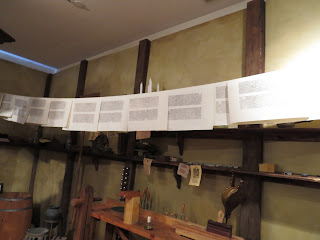Have I mentioned how great my job is? Well, it really is. In the last issue, I wrote just a few things: this, this, and this. Nothing big. Don't be impressed.
But apart from the writing and editing for BYU Mag, sometimes they ask us to edit or proofread stuff for the law school, business school, or nursing magazines. Last week, I proofread this devotional address by James Rasband called "Faith to Forgive Grievous Harms: Accepting the Atonement," and it was just so great that I thought I'd share. I don't think I have a huge issue with forgiveness. Nobody has ever really committed a grievous harm against me, but this talk really gave me some insight onto the principle of forgiveness and the Atonement.
Bro. Rasband gives the analogy of a forgiving landlord. Basically, you, as the renter, are given this really nice house and given certain rules and instructions for how to care for and improve the house. But sometimes you mess up--you punch a hole in the wall, your kitchen accidentally catches fire, you forget to put your pipes on drip when it's freezing outside and you flood the house. You get the picture. Basically, you're not the best tenant in the whole world. But your landlord is like, "You're fine. We'll fix this. No big deal." He reminds you of his instructions at the beginning, and all is well.
Well, one day, the landlord's punk son comes around and sets your shed on fire as a prank. Don't worry, it catches, and the dumb kid burns down your whole house to the ground. Photos, heirlooms, all your possessions. Gone.
So what's the landlord going to do now? I mean, he was cool with it when it was you messing up your own house, but now that it was someone else who messed things up, what's going to happen? How is he going to replace everything that you lost? Pretty sure photos and heirlooms can't be replaced. And yet, this landlord tells you that it will all be restored to you.
Despite these optimistic promises, you're still mad! You want that dang son to pay for what he's done. And frankly, you don't really trust that the landlord can make complete restitution for everything that you've lost.
Obviously, Christ is the landlord in this analogy, and Bro. Rasband's point is that He can make restitution for everything you've lost--even when it was because of someone else's mistakes or sins.
So his talk is mixed in with a lot of stuff directed to lawyers, since he was the dean of the law school at the time, just FYI. But besides all that, here are some of my favorite quotes from his talk:
"Why is it that we sometimes have trouble accepting the Atonement as recompense for the harms we suffer at others' hands? . . . We can sometimes forget that the Atonement has two sides. Usually, when we think about the Atonement we focus on how mercy can satisfy the demands that justice would impose upon us. We are typically quicker to accept the idea that when we sin and make mistakes the Atonement is available to pay our debts."
"Forgiveness requires us to consider the other side of the Atonement--a side that we don't think about as often but that is equally critical. That side is the Atonement's power to satisfy our demands of justice against others, to fulfill our rights to restitution and being made whole. We often don't quite see how the Atonement satisfies our own demands for justice. Yet it does so. It heals us not only from the guilt we suffer when we sin, but it also heals us from the sins and hurts of others."
"My testimony is that the Atonement really can make us completely whole, even for those things that seem like they can't be fixed or repaired."
He talks about how the Atonement completely fulfills the Law of Moses--more than just the law of sacrifice, but also the restitution for wrongs.
"The Mosaic law was not designed only to punish the wrongdoer. The Mosaic law also existed to protect, compensate, and make whole those harmed by others, whether intentionally or negligently. If Christ came to fulfill all the terms of the law, this part of the Mosaic law should also be fulfilled by the Atonement."
"Forgiving others . . . is a profound act of faith in the Atonement and the promise that the Savior's sacrifice repays not just our debts to others but also the debts of others to us."
"My greatest concern is that if we wrongly believe forgiveness requires us to minimize the harms we suffer, this mistaken belief will be a barrier to developing a forgiving heart."
"Sometimes we burn the house down through our own carelessness--we play with fire. Sometimes the house burns down through no fault of our own--lightning strikes and there is nothing we can do about it. Sometimes our house burns down because of the sins of others--such as with the landlord's arsonist son . . . The wonder of the Atonement is that it works for all three cases. But our own receipt of the Atonement is conditional on forgiving others."
Anyway, hope that gave you as much insight into the principle of forgiveness as it did for me!
Obviously, Christ is the landlord in this analogy, and Bro. Rasband's point is that He can make restitution for everything you've lost--even when it was because of someone else's mistakes or sins.
So his talk is mixed in with a lot of stuff directed to lawyers, since he was the dean of the law school at the time, just FYI. But besides all that, here are some of my favorite quotes from his talk:
"Why is it that we sometimes have trouble accepting the Atonement as recompense for the harms we suffer at others' hands? . . . We can sometimes forget that the Atonement has two sides. Usually, when we think about the Atonement we focus on how mercy can satisfy the demands that justice would impose upon us. We are typically quicker to accept the idea that when we sin and make mistakes the Atonement is available to pay our debts."
"Forgiveness requires us to consider the other side of the Atonement--a side that we don't think about as often but that is equally critical. That side is the Atonement's power to satisfy our demands of justice against others, to fulfill our rights to restitution and being made whole. We often don't quite see how the Atonement satisfies our own demands for justice. Yet it does so. It heals us not only from the guilt we suffer when we sin, but it also heals us from the sins and hurts of others."
"My testimony is that the Atonement really can make us completely whole, even for those things that seem like they can't be fixed or repaired."
He talks about how the Atonement completely fulfills the Law of Moses--more than just the law of sacrifice, but also the restitution for wrongs.
"The Mosaic law was not designed only to punish the wrongdoer. The Mosaic law also existed to protect, compensate, and make whole those harmed by others, whether intentionally or negligently. If Christ came to fulfill all the terms of the law, this part of the Mosaic law should also be fulfilled by the Atonement."
"Forgiving others . . . is a profound act of faith in the Atonement and the promise that the Savior's sacrifice repays not just our debts to others but also the debts of others to us."
"My greatest concern is that if we wrongly believe forgiveness requires us to minimize the harms we suffer, this mistaken belief will be a barrier to developing a forgiving heart."
"Sometimes we burn the house down through our own carelessness--we play with fire. Sometimes the house burns down through no fault of our own--lightning strikes and there is nothing we can do about it. Sometimes our house burns down because of the sins of others--such as with the landlord's arsonist son . . . The wonder of the Atonement is that it works for all three cases. But our own receipt of the Atonement is conditional on forgiving others."
Anyway, hope that gave you as much insight into the principle of forgiveness as it did for me!





.jpeg)
.jpeg)
.jpeg)



































